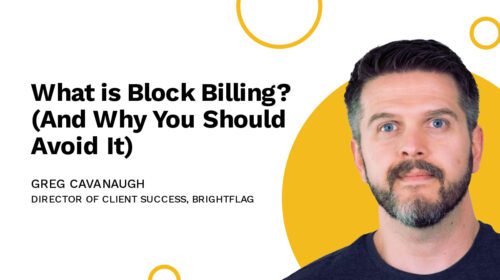Reading Between The Lines: How to Qualify Legal Tech Reviews
Looking up legal tech product reviews on Google is the right idea but the wrong approach. Yes, you absolutely should seek peer advice prior to purchase. However, finding trustworthy information from objective online sources can be difficult.
It cannot be overstated how transparent the legal operations community is—and how eager they are to help save you from expensive mistakes. However, if you’re committed to making your own informed decision while researching legal tech, it’s imperative to build sophisticated quality controls into your process.
Here are a few of the rules I recommend for quickly verifying credible reviews, surfacing relevant insights, and streamlining procurement processes.
Trust These Top Sources
When considering legal tech review sites, credibility comes down to two questions:
- Does the source demonstrate an understanding of the industry?
- Can I trust that the reviews are real?
High-quality sources will address that first requirement with accurate, exhaustive, and logically categorized product listings. Misclassified tools, mysteriously absent industry mainstays, or dated company acquisitions would all be signs that you’re in the wrong neighborhood.
Verifying the authenticity of reviews is a matter of effort and transparency. High-quality sources will deliberately increase publishing friction, granting review privileges only to reviewers with confirmed identities and purchase experiences. These qualifications should be readily presented to curious readers within the reviews.
Given these criteria, I recommend starting with G2 and LawNext.
G2 has over a decade of experience in the software review space, enforces clear authentication policies, and displays an evident knowledge of today’s legal tech landscape. It also has by far the largest volume of relevant reviews.
LawNext’s Legal Tech Directory is a newer entrant in the conversation, launching in late 2022. But the site’s heritage, structuring, and safeguards all suggest that it’s on track to become a dependable industry resource.
Additional sites to bookmark include:
- Legaltech Hub
- CLOC’s Legal Ops Solutions Directory
- AL 100 Legal Tech Directory
- Legal Operators Tech Directory
But again, I’d recommend referencing these in tandem with—rather than in place of—G2 and LawNext.
Let Data Build the Shortlist
Narrowing the focus only to G2 and LawNext still leaves you with an overwhelming amount of info to sift through. Now it’s time to look at the numbers. We can use two metrics to shrink the map even more and make better use of your time.
The first data filter to apply within a selected category is satisfaction (or “star”) rating. This will help you set a minimum threshold for product quality and distinguish a small group of vendors worthy of deeper investigation.
Each vendor’s star rating should also be weighed alongside their respective volume of reviews. A greater number of reviews tends to correlate with stronger product popularity and customer engagement. It also gives you more qualitative feedback to analyze — which is where the majority of the value ultimately lies.
Read for Recurring Themes
Following my prior two suggestions will buy you more of the time required to really engage with the next few steps. So if you are tempted to fast-forward from here, just remember all those minutes you already saved by avoiding questionable sites or unqualified vendors.
When you’re ready to evaluate a specific vendor, be sure to practice pattern recognition when digging into the reviews. Make note of any details, whether positive or negative, that are mentioned across multiple reviews (G2 does a basic version of this exercise for you with its “popular mentions” feature).
This tactic strategically insulates you against the bias or experience of any one reviewer, and quickly surfaces the insights are most likely to be true.
Filter by Personal Priorities
There will inevitably be certain legal tech evaluation criteria that you value more highly than your average peer. So in addition to passively reading reviews with an open mind, follow up with proactive searches for the details you care about most.
Start with a quick look at the preset filters provided by the website. But if you don’t see what you’re hoping for, you can always go to the search bar (or hit Ctrl + F / Command + F) and type in “implementation,” “support,” “savings,” or any other term that’s top of mind.
(Try to) find your lookalike
The average rating or recurring theme echoed by the masses may or may not be an accurate preview of your individual experience. Legal tech ultimately lives within the unique context of a customer’s organization, so it’s worth looking for the reviewer who most resembles you.
When reading through reviews and profiles, pay special attention to factors like:
- Job role
- Use case
- Practice area
- Business objectives
- Size, industry, geography
You may not find an identical match in every scenario, but the opinions of any professionals who align closely with your role and objectives should take priority if available.
Test Your Takeaways
The insights gathered from relevant legal tech reviews should not be treated as absolute conclusions. Instead, use them as seasonings that enhance the rest of your evaluation exercises.
Look back at those recurring themes. Can you steer the sales demo in their direction? Can the vendor corroborate them with case studies?
And what about that lookalike reviewer who resonated with you? Is there a way to (respectfully) contact them through the review site or social media? Can the vendor make an introduction?
You’ve already done your homework, so why not put it to work for you?
Taking the Plunge
Sifting through legal tech reviews is a daunting but necessary task if you want to find the perfect fit. You don’t have to go it alone—but if you decide to do the legwork yourself, be sure you have the tools you need to seek out reliable information from verified sources.
And if you’re curious about whether Brightflag is a good fit for what you’re looking for, check out our reviews on G2 to see what your peers are saying about us.



